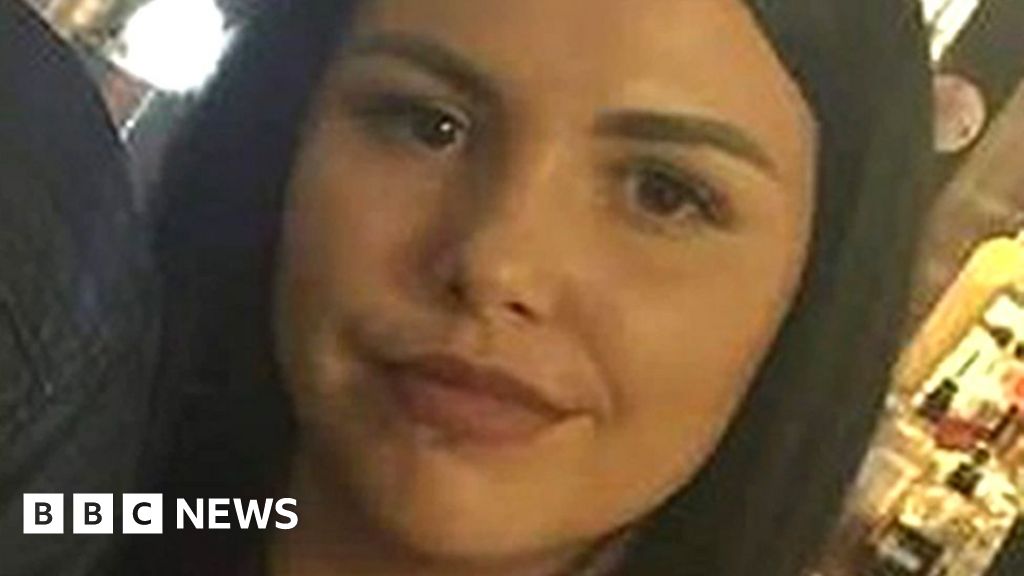 Family handout
Family handout Two people have been arrested on suspicion of manslaughter following the death of a woman believed to have undergone a non-surgical Brazilian butt lift (BBL).
Mother-of-five Alice Webb, 33, died at Gloucestershire Royal Hospital in the early hours of Tuesday after falling unwell.
Ms Webb’s partner Dane Knight urged people to think of her daughters before speculating.
Gloucestershire Police’s major crime team is investigating and the two arrested people have been released on bail.
In a Facebook appeal, Mr Knight said: “[I] Want to say a heartfelt thank you to all family and friends that were here for us at our time of need, including all of the kind messages sent to my children and myself.
“There was some very beautiful messages sent by some of your children that formed a start of a smile from the corner of my kids’ mouths.”
He also urged people to think about who is around before speaking about Ms Webb’s death.
“I [don’t want] unnecessary questions raised to the five girls, so be extremely careful on what you say and who’s around.
“Please have these five girls’ feelings at heart,” he added.
One neighbour of what the BBC believes to be the business which carried out Ms Webb’s BBL said the police had been at the premises “all day … until yesterday afternoon”.
She said she was not aware what was happening there until a reporter had told her.
“I feel very sorry … for the lady who has lost her life. Very sad all round.”
What is a BBL?
BBL is a treatment designed to make buttocks bigger, more rounded or lifted. It can be offered as a surgical or non-surgical procedure.
Surgical BBLs involve inserting silicone-filled implants and/or removing fat from other parts of the body before injecting it into the buttocks.
Non-surgical BBLs – like the one Ms Webb is believed to have had – involves injecting dermal filler into the buttocks.
The filler is often made up of hyaluronic acid. It is commonly used in facial filling treatments, including lip and cheek filler.
While non-surgical BBLs are not illegal in the UK, last year Wolverhampton City Council barred a company from carrying out the procedure after identifying risks associated with their processes, including blood clots, sepsis, and the potential for the death of body tissues.
Five local authorities in Essex and Glasgow followed suit and have banned certain companies from carrying out liquid BBLs in their area.
‘Crisis waiting to happen’
Save Face is a national register of accredited practitioners who offer non-surgical cosmetic treatments.
Director Ashton Collins said the organisation had supported 500 women who had suffered complications from the procedure.
Ms Collins said: “Liquid BBL procedures are a crisis waiting to happen. They are advertised on social media as ‘risk-free’, ‘cheaper’ alternatives to the surgical counterpart and that could not be further from the truth.”
She told BBC Radio 5 Live that facial fillers are “relatively safe”, due to the small amount of product being injected.
However, the “huge volumes” used in BBLs present a higher risk of complications.
“I can’t stress strongly enough how incredibly dangerous these procedures are,” said Ms Collins.
“I would urge anybody considering this treatment to avoid it at all costs.”
Save Face has criticised non-healthcare injectors carrying out liquid BBLs, saying they were often unable to identify and manage the complications of their clients and often misdiagnosed abscesses, and tissue necrosis as bruising.
A Department of Health and Social Care spokesperson said: “The safety of patients is paramount, and we would urge anyone considering a cosmetic procedure to consider the possible health impacts and find a reputable, insured, and qualified practitioner.
“We are exploring options around regulatory oversight of the non-surgical cosmetics sector and will provide an update in due course.”

